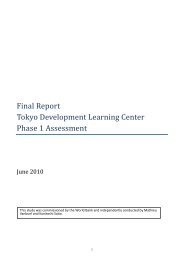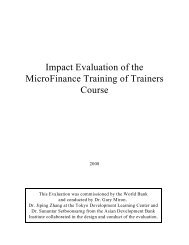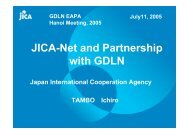Brochure (PDF File 80 Kb) - Tokyo Development Learning Center
Brochure (PDF File 80 Kb) - Tokyo Development Learning Center
Brochure (PDF File 80 Kb) - Tokyo Development Learning Center
Create successful ePaper yourself
Turn your PDF publications into a flip-book with our unique Google optimized e-Paper software.
Strengthening<br />
Disaster Risk Management<br />
in East Asia and the Pacific<br />
Distance <strong>Learning</strong> Seminar Series<br />
SESSION 1<br />
Lessons learned and knowledge<br />
sharing seminar on Post-disaster<br />
Recovery Planning<br />
VC links<br />
China (Beijing),<br />
Indonesia (Aceh, Jakarta),<br />
Japan (Kobe, <strong>Tokyo</strong>),<br />
Lao PDR (Vientiane),<br />
Philippines (Manila),<br />
Thailand (Bangkok)<br />
Vietnam (Hanoi)<br />
with live web-steaming 11:00-14:00 (<strong>Tokyo</strong> time)<br />
December 11, 2008<br />
Introduction<br />
In the 1990s, more than one billion people worldwide were<br />
affected by natural disasters, with direct economic losses of<br />
$629 billion. The East Asia and the Pacific (EAP) region are<br />
highly vulnerable to the impacts of natural disasters, ranging<br />
from earthquakes to floods to drought. Since 1990, natural<br />
disasters in the region have caused more than $50 billion in<br />
damage and affected more than 2 billion people (CRED –<br />
EM-DAT database). From FY04-07, the Bank provided<br />
financing (or managed trust fund resources of) about $1.5<br />
billion in the region to support primarily post-disaster<br />
interventions in response to floods, typhoons, earthquakes,<br />
and the 2004 Asia tsunami. Because natural disasters have a<br />
disproportionate impact on the poor, disaster mitigation and<br />
management programs are an integral part of poverty<br />
alleviation strategies.<br />
Regional Distance <strong>Learning</strong> Seminar<br />
Series<br />
As part of the EAP Sector Management Unit Initiatives, which<br />
is a program promoting outreach and knowledge-sharing, the<br />
East Asia and Pacific Disaster Risk Management (DRM)<br />
team, in collaboration with the Global <strong>Development</strong> <strong>Learning</strong><br />
Network (GDLN), has planned a learning and knowledge<br />
sharing seminar series to reach counterparts in countries of<br />
the region, as well as staff working in country offices.<br />
This seminar series will highlight three areas:<br />
‣ Post-disaster recovery planning and lessons learned<br />
‣ Risk financing and the World Bank’s new financial products<br />
‣ Local approaches to disaster risk management<br />
Within these three areas of focus, this series is comprised of<br />
6 sessions delivered via VC by connecting 5-6 countries in<br />
the region starting from December 2008 to June 2009.<br />
SESSION 1: Dec. 11, 2008<br />
Lesson learned and knowledge sharing seminar on postdisaster<br />
recovery<br />
SESSION 2: Jan./Feb. 2009 (TBD)<br />
Local government approaches to disaster risk<br />
management<br />
SESSION 3: Jan./Feb. 2009 (TBD)<br />
Overview of disaster risk financing<br />
SESSION 4: Feb./Mar. 2009 (TBD)<br />
Community approaches to disaster risk management<br />
SESSION 5: Feb./Mar. 2009 (TBD)<br />
World Bank’s new risk financing products<br />
SESSION 6: Mar. / Apr. 2009 (TBD)<br />
Emergency preparedness and response<br />
SESSION 1 INFORMATION:<br />
<strong>Learning</strong> objectives:<br />
Natural disasters cause severe damages to human,<br />
economy, environment and many aspects of the society,<br />
and consequent losses. The post-disaster recovery phase<br />
requires sensible planning based on an overall assessment<br />
of damage and losses, as well as understanding of future<br />
development goals. The focus of this session is postdisaster<br />
recovery planning, aiming to share country<br />
experiences of past recovery programs from severe natural<br />
disasters and draw lessons to improve future recovery<br />
planning.<br />
After attending the session, participants should be able to:<br />
1. Explain post-disaster stages and activities with<br />
commonly used terminology<br />
2. Understand the complexity of post-disaster recovery<br />
3. Describe priority tasks in reconstruction and economic<br />
recovery based on Japan and Indonesia cases<br />
4. Draw lessons from the real experience to assist in<br />
formulation of policy for recovery planning
SESSION 1 INFORMATION<br />
(Continued):<br />
Agenda and key issues to present and<br />
discuss<br />
• A short opening to introduce participants, program and<br />
objectives<br />
• A brief on post-disaster recovery planning concept and<br />
framework<br />
• Cases and experiences - Kobe-city, Hyogo prefecture,<br />
Japan and BRR, Indonesia<br />
• Q&A and general discussion<br />
• Conclusions<br />
The following key points will be discussed:<br />
• Overall recovery plan - what were key areas of focus?<br />
What was the timeframe? How were different<br />
aspects/sectors prioritized? How were communities<br />
engaged in its development?<br />
• Implementation of the plan - what were the roles and<br />
responsibilities of local government and line agencies? How<br />
did the local government finance recovery? What was the<br />
role of national government?<br />
• Build back better approach and quality assurance<br />
methods - how did the government ensure that new and<br />
repaired structures were resilient to future disasters? What<br />
was the approach used for school and hospital<br />
reconstruction?<br />
• What were common problems encountered and how they<br />
were dealt with?<br />
Target Audience<br />
- Central Government officials and professionals from<br />
various ministries & agencies of Finance, Planning and<br />
DRM, construction and public works, as well as those of<br />
provincial and municipal governments who are in charge<br />
or and involved in the post-disaster recovery planning<br />
and implementation<br />
- University faculty and students, think tanks, and other<br />
academics<br />
- Civil society groups, NGOs, community leaders,<br />
- World Bank staff in country offices<br />
Resources<br />
Japan:<br />
• Mr. Kazunori Adachi, Director of Reconstruction<br />
Support Division, Disaster Management &Planning<br />
Bureau, Hyogo Prtefectural Government<br />
• Mr. Yuichi Honjo, Director, Planning and Coordination<br />
Bureau (Executive Director, Kobe Institute of Urban<br />
Research)<br />
Indonesia:<br />
• Mr. Heru Prasetyo, Director of International Relations,<br />
Aceh Rehabilitation and Reconstruction Agency<br />
(BRR)<br />
Language<br />
VC Session: English. Simultaneous translation is available at<br />
each site where it is required.<br />
Delivery of program<br />
The session will be a 3-hour VC with English. Simultaneous<br />
translation will be arranged if it is requested. Session<br />
consists of 2 presentations from Japan and Indonesia<br />
followed by Q&A. The session will be chaired and moderated<br />
by WB Jakarta office staff.<br />
Webcasting (Live Streaming via Internet) of VC is available<br />
at URL: http://vcg01.worldbank.org/TDLC/<br />
To view webcasting, participants will need a PC with internet<br />
access, Windows Media Player Version 10.0. and PC<br />
speakers.<br />
Registration information<br />
Please fill out the attached registration form and send to the<br />
contact person at the location of your choice listed below by<br />
9th December, 2008.<br />
Locations & Time Slot & Contacts<br />
Aceh, Indonesia: 9:00-12:00<br />
World Bank Office<br />
Muhammad Nasir mnasir@worldbank.org<br />
Bangkok, Thailand: 9:00-12:00<br />
World Bank Office<br />
Apisit Charitsue acharitsue@worldbank.org<br />
Beijing, China: 10:00-13:00<br />
World Bank Office<br />
Tianxiu Kang - Email: tkang1@worldbank.org<br />
Hanoi, Vietnam: 9:00-12:00<br />
<strong>Development</strong> Information <strong>Center</strong><br />
Huong Thu Thi Dang - Email: hdang2@worldbank.org<br />
Jakarta, Indonesia: 9:00-12:00<br />
University of Indonesia<br />
Ameriono Ismangil – Email: ameriono.ismagil@ui.edu<br />
Kobe, Japan: 11:00-14:00<br />
International Recovery Platform<br />
Yoshihiro Imai Email: imai@recoveryplatform.org<br />
Manila, Philippines: 10:00-13:00<br />
<strong>Development</strong> Resource <strong>Center</strong> - Asian Institute of<br />
Management<br />
Mel Cledera–Email: vcledera@aim.edu<br />
<strong>Tokyo</strong>, Japan: 11:00-14:00<br />
<strong>Tokyo</strong> <strong>Development</strong> <strong>Learning</strong> <strong>Center</strong> (TDLC)<br />
Yuka Yabashi- Email: yyabashi@worldbank.org<br />
Vientiane, Lao PDR: 9:00-12:00<br />
World Bank Office<br />
S.Southivong and/or P. Somsanith<br />
Email: ssouthivong@worldbank.org<br />
Email: psomsanith@worldbank.org<br />
Contacts<br />
Program Information: Abhas Jha, Zoe Trohanis or<br />
Zeeshan Suhail (EASUR)<br />
Email: ajha@worldbank.org, ztrohanis@worldbank.org,<br />
zsuhail@worldbank.org<br />
GDLN Central Contacts: Eiko Wataya / Yuka Yabashi<br />
(TDLC)<br />
Email: ewataya@worldbank.org, yyabashi@worldbank.org<br />
Telephone: +81-(0)3-3597-1333, fax number: +81-(0)3-<br />
3597-9161
















